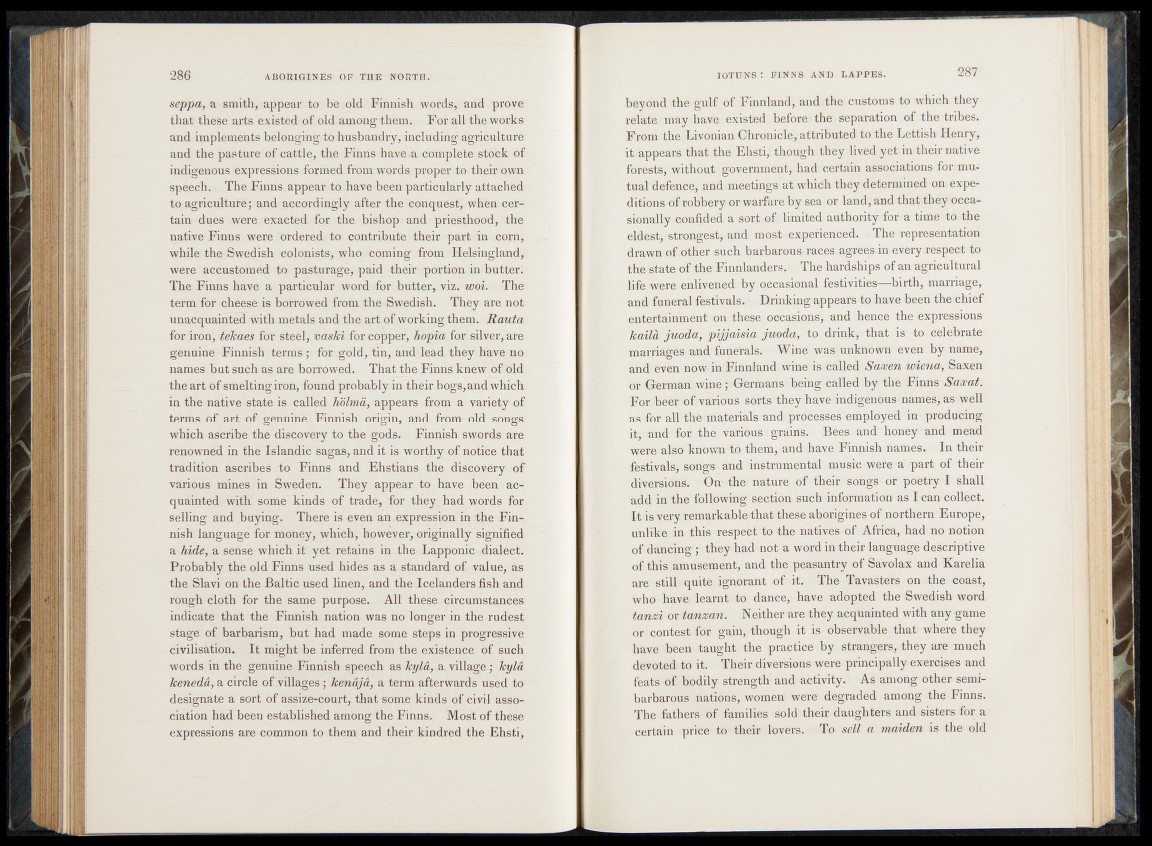
seppa, a smith, appear to be old Finnish words, and prove
that these'arts existed' of old&mong thermit F otialbthew.drks
and implements belonging to husbandry,dncluding;agiàëultorè
and the pasture of cattle, the ■ Finns ’have.a complëttef-stóck of
indigenous expressions- formed frbmrwords pieper to their own
speech . The Finns appear do; have been particularly attached
to agricuhufépand; accordingly after the conquest', when: certain
dues were,’exacted for the bishop and priesthood, the
native Finns were ordered vto* contribute their partiinitCOThi'
while the Swedish colonists, who'coming from rHelsingiandi,*
were accustomed to pasturagej paid their portion in buttééf
The Finns have a particular word for butter, viz* «üoi.’ The'
term for cheese is borrowed from the Swedish. They are- njotti
unacquainted with metals and the art of working them. Rauta
for iron, tékaes for steel; vaski for copper, hopia for’.silver/are’*
genuine Finnish terms ; for gold, tin, âiid*Jlejàd 'they’ havejao,
namesTiutsuch as are borrowed. That the Binn^kriew^ofl'old
the art of smelting iron, found probably in their bpgs, and which
in the native state is called Aö/ma, appears from a variety'?©f
terms of art óf genuine Finnish origin, andl from old sengs,
which ascribe the discovery to the gods^ L Finnish swords are
renowned in the Islandic sagas, and it is worthy of notice that
tradition ascribes to Finns and Bhstians the discovery ?o£‘
various mines in Sweden. They appear to have been-,1 acquainted
with some kinds of trade* for theyjiad words for
selling and buying. There is even an expressionrin the Finnish
language, for money, which, however, originally signified
a hide, a sense-which it yet retains in the Lapponic dialect.
Probably the old Finns used hides as a standard of value, as
the Slavi on the Baltic used linen, and the Icelanders fish and
rough cloth for the same purpose. All these circumstances
indicate that the Finnish nation was no longer in the rudest
stage of barbarism, but had made some steps in progressive
civilisation. It might be inferred from the-existence of such
words in the genuine Finnish speech as Tcylâ, & .village ; Teylâ
kenedâ, a. circle Of villages ; Jeenâjâ, a term afterwards used to
designate a sort of assize-court, that some kinds of civil association
had been established among the Finns. Most of these
expressions are common to them and their kindred the Ehsti,
beyond th©» guM|<$£ Finnlandj and the customs to which, they
relkte'- m-aydkvi^;existed1.before, the separation of the tribes*
From» the ki^obiansShronicle,. attributed to the Lettish Henry,
it.app@EfcES4tfoat the ^k^i^though-'they lived yet in»their native
forests, withmt'.jgbyernmenty* had’- c'eH.taih associations, for »mutual
d e£«c g,< b, meetings aVwhichrth;ey determined' on. ex per
ditions of robbery^Mwarfareby'sea^br land, and that theyooea-
sionally ioobbddd a ^ort^fehmited authorityJsfer a time-to,the
eldest*tsiaiongestj»and m©bb-f.experiejheedv.jir The .representation
drawn o ^ tf lr s u c h . baa'ibamuscraces^agreqsun.everyrespect to
the state sbf^h^Finnlanders .»> '< The hardships of an. agricultural
‘bfe^etevemlivened by occasional festivities—birth, marriage,
and funeral festivals., Drinkingappeafs to have been the chief
entertainmen-h^aimOse toccasipnsj, and hence the expressions
kaild juoda,-pijjaisia juoda, to 1 drink, ithat fj^to celebrate
maTHdgibahbfu-nbrals. Wine- wa&m-nkpown»Oven1 by name,
ahd! even now. irgEinnland wine.is-called^S am n wiena, Sa«en
Or .©erman^iwine ^'Germans being called by-the-Finns- Saxat.
F^beW?0f'viia‘0^s^s©ntnHdiey have- indigenous ■ names, as-well
as fo^afUfehn materials und^prd^ekes'c'mp'ldybd-'lti prodhcinf
it, and'for th e *vaiior^f grains. Beess':and'*honey and mead
were- alsobnown -to them, and have^Firibash names.* In their
festivals, songs* and instrumental music were a part of their
diversion^: - On-the nature» of their songs or poetry I shall
add in the following section such information as I can collect.
IfdfcVery remarkabledhatthese aborigines of northern Europe,
unlike in this respeet to the natives-of Africa, had no notion
-of dancing*; -they had not a- word in their language descriptive
of this amusement, and the peasantry of Savolax and Karelia
are still quite ignorant of it. The TaVastefs on the coast,
who have learnt to dance, have adapted the Swedish word
tanxi or tanxan. Neither are they acquainted with any game
or-contest for- gain, though it is observable that where they
have been taught the practice by stranger«,’ they are much
devoted to it. Their diversions were principally exeroises and
feats of bodily strength and activity. * As among other semi-
barbarons nations, women’ were degraded among the Finns.
The fathers of families sold their daughters and sisters for a
certain price to their lovers. • To sell a maiden is the old